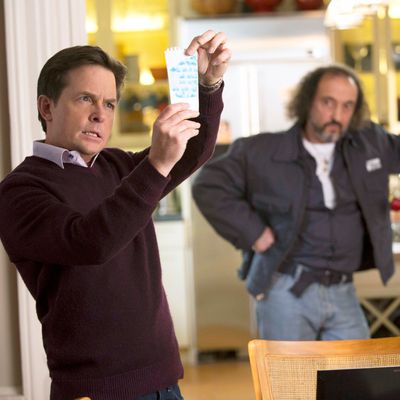
The Michael J. Fox Show didn’t have to be good to be popular, but it is good, and I hope it’s popular.
Its star was a truly exceptional comic performer back in the day. As Alex P. Keaton on Family Ties, the conservative butt of post-hippie liberal jokes, Fox became one of the biggest names in eighties TV — proof that a show’s most fascinating character will always become its star and the person you feel for the most, even if he was written as a laughingstock. It’s wonderful to realize after just a few minutes of The Michael J. Fox Show that Fox is still great, but that it’s a different kind of greatness.
His Parkinson’s diagnosis has altered his timing and overall approach without compromising his talent or his original screen presence. He often played some variation of the lovable imp, a diminutive, handsome smooth-talker who prided himself on his ability to outthink or outtalk anyone who stood between him and his goals. Fox can’t convincingly play that sort of guy anymore, and his character, former hotshot local newscaster Mike Henry, can’t do it, either. That’s why Fox took a sabbatical from showbiz after a stint on Spin City, and it’s why Henry took time off from TV news: ostensibly to be with his family (though he was sincere about that) but mostly, we gather, to figure out a new way to be “himself.”
This show is about Henry figuring that out, but from the looks of it, Fox is already at least partway there. When you watch Fox here, 30 years after his Family Ties heyday and more than a decade after Parkinson’s forced him to retire from his next big hit, Spin City, you might be reminded of what happens to a dancer or a singer or boxer as they age: They can’t leap as far or sing as high or fight as long as they used to, but if they’re smart, they can compensate for their physical losses with intelligence, wisdom, and experience. There’s more wisdom to Fox’s performance, a sense of great weight borne for years and then factored into daily life. I never would have attached the word gravitas to him before, but he’s earned it. You can feel it in the way he looks at his onscreen wife and kids and co-workers, and the way he navigates the world: a bit more slowly and cautiously than before, but with the same sense of hopefulness and curiosity and indefatigable cockiness or arrogance that made him so exciting when he was younger. He’s not an irresistible force anymore, but he’s still a force.
The typically scene-setting pilot fills in the gaps. Mike’s news director — played with buoyant energy by the great Wendell Pierce, the Danny Ocean of scene-stealing — conspires with Mike’s wife, Annie (Breaking Bad’s Betsy Brandt), to lure him back to the station, where he’s treated as a prodigal hero but feels rusty and out of place. We see glimpses of Mike’s hotshot TV past, and learn why he quit the business and why he’s so reluctant to return. (In one of many grimly amusing flashbacks, we see Mike, who’s recently begun losing control of his muscles, drifting out of camera range because he can’t plant his feet under his wheeled desk chair.) Like Fox himself, Mike Henry doesn’t want to be known as the Parkinson’s guy, much less the guy who quit doing the thing he was born to do because he found out he had Parkinson’s. This is a struggle every disabled person faces — it’s probably fair to say everyone faces some version of it, whether the burden is physical or emotional — and it’s wonderful to see a sitcom taking it seriously even as it treats it lightly.
It’s not a great show right out of the gate, but I would not be surprised if it became one. The show’s chilled-out confidence (as if it were starting its second season rather than its first) is appealing, and the cast’s Swiss-watch timing makes even lackluster exchanges crackle, but The Michael J. Fox Show’s selling point is its multivalent comic richness. You could describe it as “a sitcom about a guy with Parkinson’s” and not be wrong, but you’d be equally correct if you described it as a domestic comedy about balancing work and life, or a show about the challenge of maintaining even an essentially happy marriage (episode two is about Mike’s mortifying crush on a neighbor), or a show about the bittersweet pleasure of being beloved as the legendary performer you once were rather than celebrated as the man you now are. Fox’s still formidable comic chops unify these facets, and the fact that he does, in fact, have Parkinson’s gives him license to demystify the condition, even treat it as a source of shtick. Intentionally spilling food on Pierce’s character to signal disapproval, Mike chirps, “Oops, Parkinson’s!” He’s not just using it, he’s owning it.
This is an expanded version of a review that ran in the September 30 issue of New York magazine.


